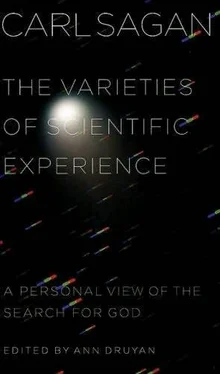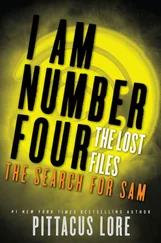Then there are cases of so-called high evidence. Photographs, for example. One of the earliest photographs of UFOs from the late 1940s was from a man named George Adamski, who was a space enthusiast and, in fact, identified himself in his first book as George Adamski of Mount Palomar. Mount Palo-mar was then the site of the largest optical telescope on the planet. And George Adamski was from Mount Palomar. He owned a hamburger stand at the base of Mount Palomar, in which he had a small telescope, and through that telescope he photographed wonders that the astronomers, consigned to the lofty recesses of the mountain, never saw.
One of his most famous photographs shows a clearly metallic, saucer-shaped object with three large spheres at the bottom, which he identified as landing gear and which later turned out to be a chicken brooder suspended by thread. This is one of those devices that encourages the eggs to hatch, and ordinary light-bulbs are used to warm it. And indeed there developed an entire detective industry to determine what common object was being photographed close up to explain this particular unidentified flying object case.
Now, I've probably made the point implicitly, but let me make it explicitly. I do not think there is any fundamental difference between this sort of UFO hoaxmongering and the sale of relics in the Middle Ages-pieces of the true cross and so on. The motivations are almost identical.
There are also cases, and Adamski was one of them, where people not only photograph or see UFOs but are hailed by the occupants and taken aboard. Some of these cases are useful to examine in retrospect. For example, Adamski was taken to the planet Venus, where conditions were very much like those in Eden. The extraterrestrials spoke mellifluously, walked among rivulets and flowers, wore long white robes, and gave heartening religious homilies.
We know now, as we did not know then, that the surface temperature of Venus is nine hundred degrees Fahrenheit. The surface pressures are ninety times what they are in this room. The atmosphere contains hydrochloric acid, hydrofluoric acid, and sulfuric acid. So at the very least, the long white robes would have been in tatters. We can in retrospect see that there must have been something wrong with the story. Maybe he just got the planet wrong. But one is left with the distinct impression that Adamski's account was contrived out of whole cloth.
It is remarkable that in all these million cases there is not one example of physical evidence that sustains even the most casual scrutiny. No pieces of spacecraft chipped off with a penknife and put into an envelope and carried back for laboratory examination of exotic alloys. No photograph of the interior of the spacecraft or the extraterrestrials, or a page from the captain's logbook. Somehow, in all of these cases, there is not a single example of concrete physical evidence. And that again is suggestive, I maintain, that we are dealing with some combination of psychopathology and conscious fraud and the misapprehension of natural phenomena, but not what is alleged by those who see UFOs.
I'd like to give you a specific case, because I think it's an example of how people with the best intentions in the world can nevertheless be badly fooled. Sometime in the 1950s, a highway patrolman in New Mexico is driving along a rural road that he knows extremely well, having driven along that road many many times. And, to his astonishment, he sees a large, saucer-shaped object just settling down on the ground, the sunlight glinting off it. He's astonished. He pulls off to the side of the road and examines it. He then drives some tens of meters away to an emergency telephone at the side of the road and gets patched in to some scientists he happens to know at Los Alamos National Laboratory. He tells them, "The most extraordinary thing has just happened to me. This is a once-in-a-lifetime opportunity. I have just seen a flying saucer land. It is within my sight now. I have not had anything to drink. I am fully awake. I am in full possession of my senses. And if you get out here right away with monitoring equipment, we have the find of the century."
This scene is so compelling that the scientists are able to commandeer a helicopter and fly to the site. They land on the highway, approach the policeman-and, sure enough, in front of them is just what he described. Saucer-shaped, metallic, large, gleaming in the Sun. So, carrying their equipment, they rush toward it, and as they approach, they notice a farmer who is doing his farming things, totally oblivious to this large saucer that has just landed in front of him. They start thinking, is it possible that the saucer is invisible to the farmer but visible to them? Maybe the farmer has been hypnotized. They approach. The farmer finally sees them, if not the flying saucer, and challenges them. Why are they trespassing on his land? They say, "Because of the saucer." "Saucer? What saucer?" He turns around and looks exactly at it and apparently does not see it. Well, it turns out, after some few minutes of confused discussion, that what they were seeing was a silo for the storage of grain that the farmer was using, that he had himself made from-I've forgotten now from what, but it was indeed saucer-shaped-that he had been using for years.
Everything the highway patrolman had seen was right, except for one small detail. He had the impression that he had just seen it land, and he had not. Everything else was exactly as told. And what this stresses is that in an argument of this sort every link in the chain of argument has to be right. It's not enough for most links in the chain to be right. If you have one weak link, the entire chain of argument can collapse.
Now, it is sometimes said that people who take a skeptical approach to UFOs or ancient astronauts or indeed some varieties of revealed religion are engaging in prejudice. I maintain this is not prejudice. It is postjudice. That is, not a judgment made before examining the evidence but a judgment made after examining the evidence.
It does not say that as you finish reading this you will not walk outside and come upon a metallic flying saucer sitting there, posing embarrassment to the author. I would gladly trade my embarrassment for a genuine contact with an extraterrestrial civilization. But I maintain that after we have a certain amount of experience with such cases, an overall trend becomes clear, and that is that in cases of this sort we are enormously vulnerable to misunderstanding, to misevaluating. What we are talking about is not significantly different from what is called a miracle.
The definitive work on miracles was written by a famous Scottish philosopher, David Hume. In his book An Inquiry Concerning Human Understanding, in a famous chapter called "Of Miracles," Hume is considering a slightly but not very significantly different case.
When anyone tells me that he saw a dead man restored to life, I immediately consider with myself whether it be more probable that this person should either deceive or be deceived or that the fact which he relates should really have happened. I weigh the one miracle against the other and according to the superiority which I discover, I pronounce my decision. Always I reject the greater miracle. If the falsehood of his testimony would be more miraculous than the event which he relates, then and not till then, can he pretend to command my belief or opinion.
And another way in which this has been phrased is by Thomas Paine, one of the heroes of the American Revolution, who is essentially paraphrasing Hume. He says, "Is it more probable that nature should go out of her course or that a man should tell a lie?"
What is being said here is that mere eyewitness testimony is insufficient if what is being reported is sufficiently extraordinary. Paine goes on to say,
Читать дальше










